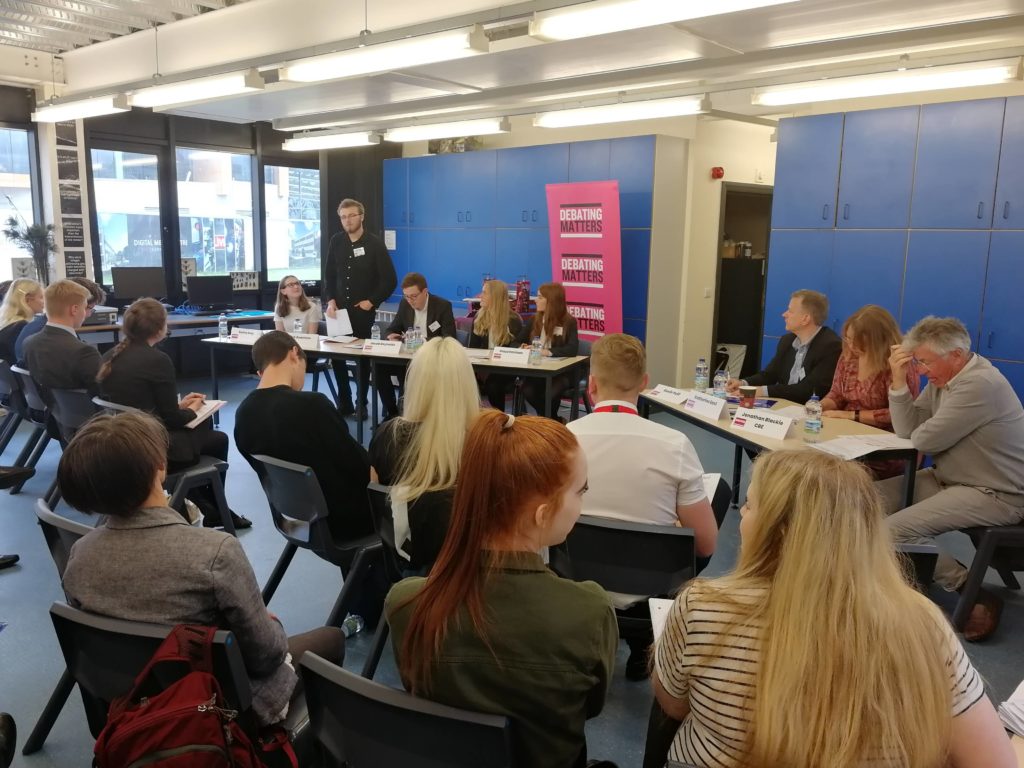Resource pack section 1C
The key to getting debate activities going in schools are you, the teacher, an excited bunch of students and some lively issues to debate. Below are some tips and suggestions for a debate programme, to help you along in the process. These points aren’t prescriptive, but are taken from the experiences of teachers we work with at Debating Matters who have started debate activities up at their school from scratch. Feel free to borrow what you like!

PROGRAM WEEK 1: SETTING UP YOUR DEBATE GROUP
■ Identify your ‘debate club committee’
■ Set up a first meeting
■ Agree a programme for the term, with a key aim for the end of term. e.g. a live formal debate
ACTION POINT: IDENTIFY STUDENTS WHO YOU THINK WOULD BE GOOD TO HAVE ON BOARD AND MAKE THEM PART OF THE COMMITTEE While publicity is very important in drawing in a self-selecting audience, momentum around the group will grow if you have some enthusiastic students on side who can then recommend and promote the group to their friends. Many teachers we have spoken to suggest that having an initial group of students committed to the cause helped build their activities enormously.
TEACHER TIP: “Give pupils ownership of when debates are (give them a few dates to choose from) and have them on different evenings – this encourages others to come and check it out.”
ACTION POINT: A REGULAR GROUP As a minimum, a regular (perhaps weekly) group is essential to establish and sustain momentum, and can be quite informal initially. Identify a suitable time, meeting place, and who will be invited to participate. A Sixth Form debating group is ideal, but your own circumstances will dictate what is appropriate, and teachers have used all kinds of ideas to get lively debate happening in their schools.
TEACHER TIP: “There is nothing like the competitive instinct to motivate students. We found that entering a competition early on provides a focus for the debate club.”
TEACHER TIP: “Choose a group of students that you would like to work with. Their involvement will not only encourage others to attend (far more so than notes in registers etc.) but will also encourage them to take responsibility for its success.”
PROGRAM WEEKS 2-3: RESPONDING TO ARGUMENTS
■ Get your group to create reasoned responses to provocative and controversial arguments, whether they take them from video pieces or articles
ACTION POINT: GET STUDENTS TO RESPOND TO A CONTROVERSIAL OPINION Students can get worked up very easily! In organising debate activities in school you should make use of this propensity, but also work out ways to challenge your group’s prejudices – that is to expose their ideas about the world to research and rational debate. One way to do this might be to find an article written by a ‘provocative writer’ and get them to discuss it. For example, TV historian David Starkey was pilloried last year for his comments about the London riots, and branded a racist, but might some of what he said be worthwhile discussing? Or should he have been banned from saying it, as some suggested in the aftermath? Related to this, are there some things that people just shouldn’t be allowed to say? Or is free expression absolute, no ifs or buts? Play a clip of the discussion and get students to respond, asking plenty of questions that will challenge their assumptions. Alternatively, you might play a clip of someone putting forward a more mainstream position in a current debate, and then ask students to critique their arguments.

TEACHER TIP: “I always go on the Today program and the headlines from the BBC website to identify some good stimulus material. I also use “The Week” as it has good one page summaries of topics that can then be used to develop a debate.”
PROGRAM WEEKS 4-6: GET DEBATING
■ Invite different members of the club to go head-to-head on an issue in each week
■ Decide on topics in advance and give them some materials to use in their preparation
■ On the day students would give 3-5 minute introductions and then the discussion should be opened up to points from other members of the club
■ Develop the formality of the debate so that it leads naturally into the programme for weeks 7&8
ACTION POINT: SELECT LIVELY TOPICS As debating develops, more complex or nuanced issues can be addressed, where there needs to be sophisticated analysis and discussion. More formal speeches and structured debates can be developed when everyone is comfortable with the principles. It is worth building on students’ own interests in the selection of topics, but the Debating Matters website has a large library of suggested topics and supporting material called Topic Guides. Our experience has shown that students tend to do more thinking, researching and reflecting on issues that are more removed from their own experience
TEACHER TIP: “It sometimes works to have a few more familiar topics at the beginning e.g. abortion, euthanasia. I’ve found that the students love to do topics they are doing in RE, ethical issues they already know about.”
PROGRAM WEEK 7: WATCH DEBATING MATTERS IN ACTION
■ Watch one of the debates filmed here.
■ Organise a discussion afterwards, commenting on team performances and arguments used
ACTION POINT: WATCH AND CRITIQUE What watching these films can help to develop is an atmosphere of critical engagement with one another and current affairs issues more broadly. Seeing judging panels in action, and debaters’ responses to them, can also help students prepare for the challenge of the real thing.

PROGRAM WEEKS 8-9: TRYING THE DEBATING MATTERS FORMATS
■ Set a date for a formal debate
■ Decide on topics a few weeks before if possible
■ Encourage preparation, preparation, and more preparation (if using Topic Guides tell students to read everything in the essential reading section – twice!)
■ Choose colleagues who you think will do a good job of putting students through their paces as judges of the debates. A profile of a good judge can be found in section 2
ACTION POINT: TRY THE DEBATING MATTERS FORMAT OUT Organising a lunchtime or after-school debate, with speakers, judges and an audience – all of whom can be found within your school – will bring the idea to life and might help to recruit new members to your club. This will involve some organisation but would help you to galvanise support. Advice for organising a Debating Matters debate can be found in section 2. Importantly you are now including others in the debate club, so will need to make sure that students are ready to do the club proud! Again, arming them with plenty of research material is key to this.
TEACHER TIP: “Economics debate? Get an economics teacher to judge. A) it ropes in other staff, who may then want to come to more, and B) subject experts will be able to push pupils further. Also, bring governors in as judges – they love it, and it makes the kids rise to the occasion.”
PROGRAM WEEK 10: COMPETITION AND DEBATING OTHER SCHOOLS
■ Sign up to take part in the Debating Matters Competition
■ Contact Debating Matters for recommendations of local school teams/clubs you could invite to debate your own school
■ Get in contact with the Debating Matters team to let us know how it went
ACTION POINT: ENTER THE DEBATING MATTERS COMPETITION You may find very early on that your students want to enter the Debating Matters competition – the competitive urge is very strong! This should be encouraged, and you might, for example, want to ask one of the network of Debating Matters alumni to visit the school and explain what it’s like to take part. For Alumni details see website.
ACTION POINT: START DEBATING OTHER SCHOOLS A brilliant way to round off a term of debate would be to organise a one-off debate with another school – this should be planned early on in the term. Even with one other school, there needs to be agreement about the topic, who will take which side, who will (neutrally!) chair the debate, and who the judges will be.

TEACHER TIP: “Allow students to fail – they respond well to it in fact. Don’t be afraid to tell pupils it wasn’t good enough – if the debate is poor, let it run its natural length, and break it down afterwards.”

